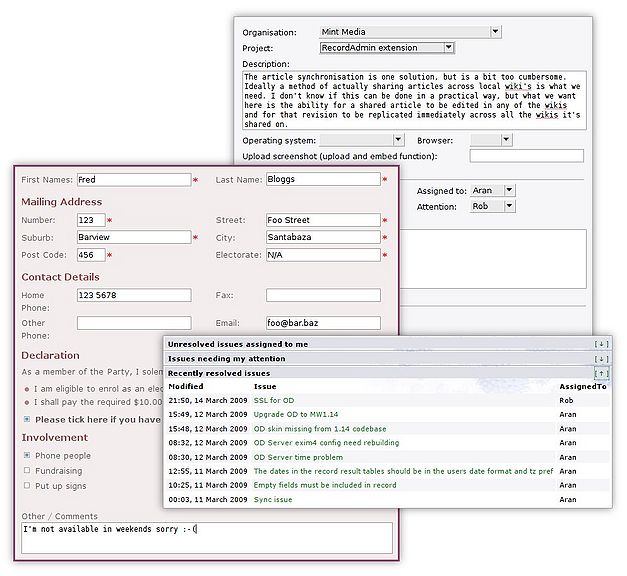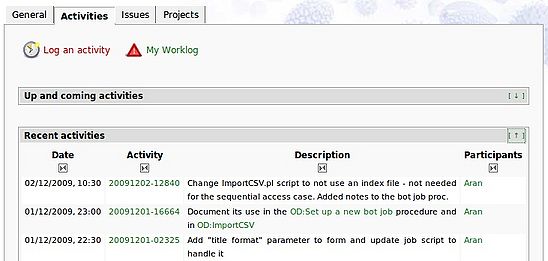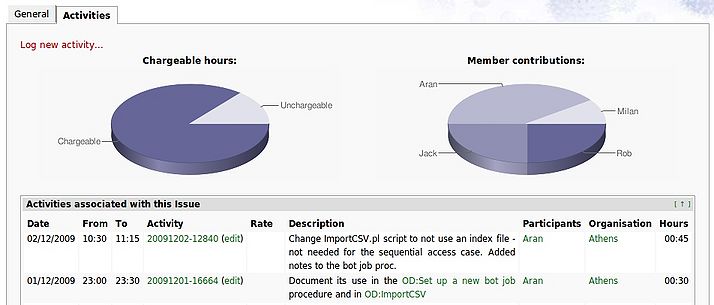Wiki Organisation
Wiki Organisation is about our vision to create an organisational framework that has specific procedures but is also generic, usable by any group working together on any mission. Wiki Organisation is a good start toward this, but the vision is not a specific technology, it is a way of working that can be encapsulated by or implemented within almost any collaborative environment. The system and its definition are continuously refined, as we use it to organise and manage our own jobs and projects. The whole system is encapsulated in an tree structure named the Organic Ontology, which will help to make the system usable in other software environments rather than just MediaWiki.
The reason we chose MediaWiki is because it fulfilled our basic technical criteria, and it is also being used to run Wikipedia, which has a large and active community. The code is well-tested and under continuous development, and possesses proven scalability. We agree with the philosophy of Wikipedia's parent organisation (the Wikimedia Foundation): "Imagine a world in which every single human being can freely share in the sum of all knowledge. That's our commitment." Using MediaWiki aligns us with that philosophy and with its development momentum. There are many people familiar with the software interface, and much freely accessible content and knowledge.
Many organisations and projects are using wikis for more than just their content management needs. The wiki environment also works very well as a project management system due to it's inherent collaboration and auditing facilities. A basic wiki installation can be used for this by adopting working conventions that all of the wiki users in the organisation are familiar with and can refer to when necessary. Users can document their standard procedures and work on jobs together in accordance with a simple workflow model called the blackboard metaphor. This is how the administrators collaborate on work together for the Wikipedia online encyclopedia project which the MediaWiki software was created for.
The blackboard metaphor is a very good system for users who are scattered around the world in different time zones, speak different languages and work casually in their roles whenever they have time available. But for organisations working on an intranet together their needs are often more complex and dynamic, requiring tight schedules, records and reporting and a generally higher level of structure. This could still be done with a basic wiki installation and the blackboard metaphor, but would require extremely well defined practices and a very high level of skill from all the users. This is where our concept of "wiki organisation" enters the picture.
Contents
Wiki Organisation Package
At Organic Design we've been developing a "wiki organisation package" for the last few years which extends the basic wiki functionality to allow for an arbitrary level of complexity in terms of the organisational system that can be run in the wiki environment, while at the same time requiring user to only have a basic knowledge of the wiki.
The wiki organisation package essentially offers the ability to have a custom made application created within the wiki environment which can even be modified by the users themselves after they've become familiar enough with it. This "collaborative application" aspect gives it a huge advantage over the standard desktop application paradigm, but on top of this, every change made to the application or any of the work being carried on within it is fully auditable and reversible since it's all part of the wiki's content which inherently comes with full history.
Even our basic installations come with all the wiki organisation extensions at no additional cost, but to have the structured content fully implemented for your organisation can take a lot of work to initially set up depending on the complexity of the aspects of your organisation you wish to model. The image below shows a few examples taken from some wikis currently using the wiki organisation package.
Personal Information Management
Usually when wikis are used within organisations much more detailed information is required about the users, and information is usually required for many other people the organisation is affiliated with even when they are not users of the wiki. For this reason, we prefer to "hide" the concept of a user and instead work with Person records which can have much more detailed, structured and customisable information associated with them.
The form associated with Person records is integrated into the user account-creation process and user preferences forms so that details can be maintained and entered from a single point rather than having to maintain information about both user and person aspects. The images below show screenshots of the account-creation and preferences forms from a wiki which is running the organisational package.
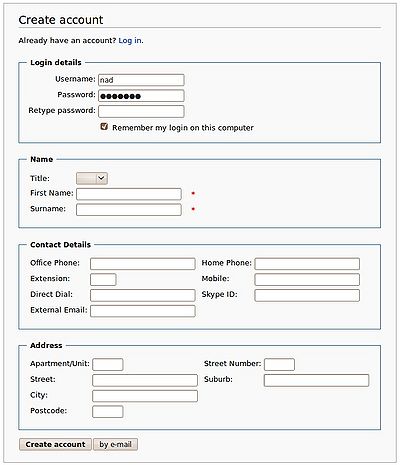
|
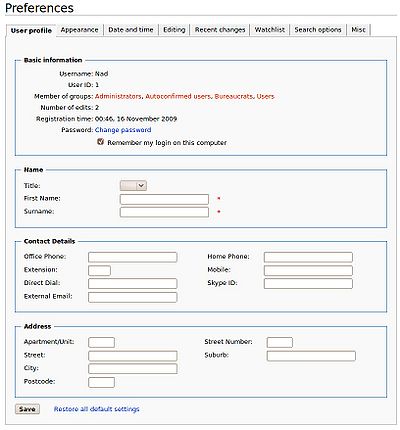
|
User Administration
Non-sysop users can only make changes to the properties of their Person record via the preferences page or at account-creation time. Person records have an administration section which is not included in the preferences or account-creation forms. This means that security and other administration data can be maintained in the Person record to be updated by sysops. When users are created by sysops the administration section is included so that they can set the administration properties and general properties in one go.
External Contributors
Users who are created with this administration option set are able to log in to the wiki, but only have access to the public articles. These users can then be added to roles which give them access to specific documents or categories.
Email Settings
For wiki organisations running on a local intranet that has a server installed with our install a new server procedure the email settings in the Person records can be tied to the servers email configuration via our robot framework. The settings allow wiki users to have one or more corresponding IMAP accounts, and each of these accounts can have any number of email aliases or forwarders. Users can also set an optional auto-responder message from their Person record. The aliases and forwarders settings are administration settings that are only settable by sysops currently.
Roles
In the same way that we've replaced the standard wiki user with a Person record, we've also replaced the standard wiki group with the Role record. Role records contain properties concerning duties and rights and can also have a single IMAP account associated with them that can have an auto-responder and any number of email address aliases and forwards. Currently the rights supported offer control over shared file access and mediawiki group membership. There is also a ReportsTo property in the role form which allows a role hierarchy to be created whereby roles inherit all the rights of their child roles.
Project management
Each wiki user's personal page is no longer User:Bob, but rather their full name, e.g. Bob McFoo automatically has a special template added which offers useful information about their profile, activities and issues (tasks) assigned to them and about the project's they're involved with. Here's an example of what it looks like.
As with Person records, each Issue also has a similar set of tabs (as do all the different kinds of records such as Project, Role or Invoice etc). Below is an example of an Issue record showing some useful information about the activities associated with it.
